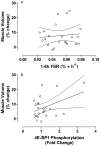Acute post-exercise myofibrillar protein synthesis is not correlated with resistance training-induced muscle hypertrophy in young men
- PMID: 24586775
- PMCID: PMC3933567
- DOI: 10.1371/journal.pone.0089431
Acute post-exercise myofibrillar protein synthesis is not correlated with resistance training-induced muscle hypertrophy in young men
Erratum in
- PLoS One. 210;9(5):e98731
Abstract
Muscle hypertrophy following resistance training (RT) involves activation of myofibrillar protein synthesis (MPS) to expand the myofibrillar protein pool. The degree of hypertrophy following RT is, however, highly variable and thus we sought to determine the relationship between the acute activation of MPS and RT-induced hypertrophy. We measured MPS and signalling protein activation after the first session of resistance exercise (RE) in untrained men (n = 23) and then examined the relation between MPS with magnetic resonance image determined hypertrophy. To measure MPS, young men (24±1 yr; body mass index = 26.4±0.9 kg•m²) underwent a primed constant infusion of L-[ring-¹³C₆] phenylalanine to measure MPS at rest, and acutely following their first bout of RE prior to 16 wk of RT. Rates of MPS were increased 235±38% (P<0.001) above rest 60-180 min post-exercise and 184±28% (P = 0.037) 180-360 min post exercise. Quadriceps volume increased 7.9±1.6% (-1.9-24.7%) (P<0.001) after training. There was no correlation between changes in quadriceps muscle volume and acute rates of MPS measured over 1-3 h (r = 0.02), 3-6 h (r = 0.16) or the aggregate 1-6 h post-exercise period (r = 0.10). Hypertrophy after chronic RT was correlated (r = 0.42, P = 0.05) with phosphorylation of 4E-BP1(Thr37/46) at 1 hour post RE. We conclude that acute measures of MPS following an initial exposure to RE in novices are not correlated with muscle hypertrophy following chronic RT.
Conflict of interest statement
Figures




References
-
- Terzis G, Georgiadis G, Stratakos G, Vogiatzis I, Kavouras S, et al. (2008) Resistance exercise-induced increase in muscle mass correlates with p70S6 kinase phosphorylation in human subjects. Eur J Appl Physiol 102: 145–152. - PubMed
-
- Wilkinson SB, Tarnopolsky MA, Macdonald MJ, Macdonald JR, Armstrong D, et al. (2007) Consumption of fluid skim milk promotes greater muscle protein accretion after resistance exercise than does consumption of an isonitrogenous and isoenergetic soy-protein beverage. Am J Clin Nutr 85: 1031–1040. - PubMed
-
- Tang JE, Moore DR, Kujbida GW, Tarnopolsky MA, Phillips SM (2009) Ingestion of whey hydrolysate, casein, or soy protein isolate: effects on mixed muscle protein synthesis at rest and following resistance exercise in young men. J Appl Physiol 107: 987–992. - PubMed
Publication types
MeSH terms
Substances
Grants and funding
LinkOut - more resources
Full Text Sources
Other Literature Sources
Medical
Molecular Biology Databases

